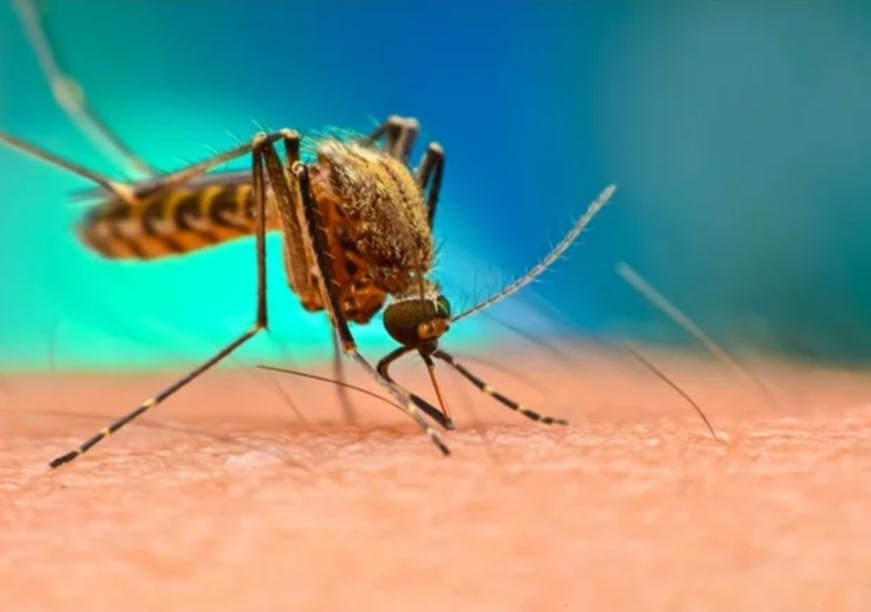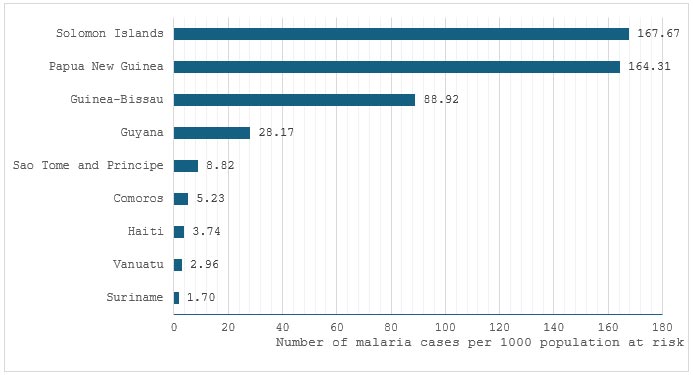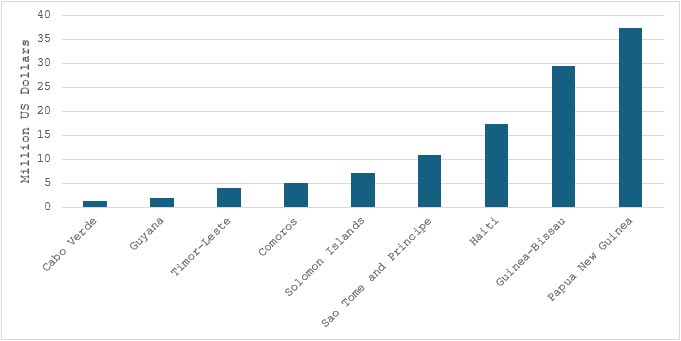-
CENTRES
Progammes & Centres
Location
The rising cases of malaria in SIDS need a renewed global response to mitigate climate-induced transmission and re-emergence

Commemorated annually, World Malaria Day (25th April), continues to serve as a critical reminder of the ongoing battle against malaria, raising the significance of addressing the determinant factors such as health equity, gender vulnerability, and the impact of climate change. Malaria remains a significant public health challenge worldwide, with an estimated 249 million cases and 608,000 deaths in 2022. The degree of its impact on livelihood, long-term economic growth, and development in vulnerable countries has been significantly rising than ever before. This becomes a cause of concern, especially with the volatility and uncertainty amplified by climate change. The relationship between malaria and climate change is complex due to the influence of external factors of demographics, migration, urbanisation, and land use. However, the climate change-induced fluctuations in global temperatures and rainfall that are suitable for the malaria parasite and vectors have an immense potential to increase transmission, resurge malaria in eliminated areas, and induce loss of livelihood.
The relationship between malaria and climate change is complex due to the influence of external factors of demographics, migration, urbanisation, and land use.
The Small Island Developing States (SIDS) in particular are disproportionately impacted by climate change and are more susceptible to the rising numbers of Malaria cases. Figure 1 depicts the number of malaria cases per 1000 population at risk in SIDS as of 2020. However, between 2021 and 2022, a rise of 23 percent was observed in the number of malaria cases, reaching 1.9 million cases in the WHO Western Pacific region, constituting several SIDS. Papua New Guinea accounted for 90 percent of the cases and a 29-percent increase in deaths due to malaria in the region. While the SIDS in the Caribbean region have mostly eliminated malaria, political instability, civil unrest, climate shocks, and underfunding in states like Haiti continue to be a threat and hindrance to progress in healthcare infrastructure resilience and the flow of essential resources. Thus, these rising instances of malaria in SIDS need a renewed global response to mitigate climate-induced transmission and re-emergence.
Figure 1: Incidence of malaria per 1,000 population at risk in SIDS (2020)

Source: United Nations Development Programme (UNDP)—SIDS Portfolio
There is a need for policy interventions in SIDS that not only address the health concern but also address the systemic challenges of limited healthcare infrastructure, declining funding, inadequate resources, lack of robust surveillance, and fragmented governance structures. In 2015, the World Health Organisation (WHO) launched the Global Technical Strategy for Malaria 2015-2030, which aimed to reduce the global malaria cases and mortality rates by at least 90 percent by 2030. The Global Malaria Programme and A Framework for Malaria Elimination were also initiated to facilitate countries to reach the targets set for 2030 by the technical strategy. The United Nations Development Programme (UNDP) released the Comprehensive Multisectoral Action Framework for Malaria and Sustainable Development which envisions that a “whole-of-society, whole of government and health-in-all-policies” approach is vital in malaria elimination. However, despite these initiatives, it was only during the Fijian presidency of COP23 that malaria was mentioned in the special initiative and regional plans launched with the partnership of WHO and the United Nations Framework Convention on Climate Change (UNFCC) Secretariat that acknowledged the interlinkage and vulnerability of climate change and health in SIDS.
The Global Malaria Programme and A Framework for Malaria Elimination were also initiated to facilitate countries to reach the targets set for 2030 by the technical strategy.
While global initiatives are in place to increase health system resilience against malaria, funding such initiatives becomes critical. Since 2002, multilateral financing initiatives such as the Global Fund to Fight AIDS, Tuberculosis, and Malaria have contributed significantly to addressing the disease-prone and vulnerable areas. Figure 2 depicts the allocation of Global Fund 2023-2025 for Malaria in SIDS, highlighting the recognition of the dire state in Papua New Guinea. However, the high dependence on the United States (US) for global malaria funding, which accounts for 36 percent of the funds, could lead to a disproportionate influence on national malaria policies and outcomes in aid-receiving countries. Additionally, the WHO suggests that the funding gap has been widening with a deficit of US$2.3 billion in 2018 to US$3.7 billion in 2022. This trend could be particularly concerning for SIDS. As the GDP per capita has been used as a measure to decide the provisions of aid, their low population size can hinder the allocation of funds despite being highly vulnerable to climate-induced health challenges.
Figure 2: Global Fund 2023-2025 Allocations for Malaria in SIDS (in million US Dollars)

Source: The Global Fund
One of the effective means to prepare and prevent malaria transmission is by promoting and ensuring the use of vaccines. Following the success of the pilot project of distributing the RTS/AS01 malaria vaccine under the Malaria Vaccine Implementation Programme (MVIP), 18 million doses have been allocated for distribution between 2023 and 2025 among the highly vulnerable regions of Africa. While this allocation of vaccines is still insufficient, the expansion of such programmes to SIDS can become critical for their preparedness. To procure malaria vaccines in the future, the SIDS must develop mechanisms to collect accurate and consistent data on its requirements to reduce wastage. There is also a need for enhanced transdisciplinary and global scientific collaboration in research on climate-health interlinkages in SIDS as it could also help in determining the specific requirements of cold chains for these island states. While the role of international players such as the US and China in supply-chain management of the malaria vaccines and mitigation of malaria in SIDS has been vital, the increasing involvement of emerging powers like India in global health initiatives can accelerate the progress of building climate-resilient health system among the islands.
To procure malaria vaccines in the future, the SIDS must develop mechanisms to collect accurate and consistent data on its requirements to reduce wastage.
Being known as the “pharmacy of the world”, India has immense potential to mitigate the risks of malaria in SIDS through its expertise, quality, and cost-effective supply of malaria vaccines. With India increasingly willing to be a leader in global health governance through health diplomacy initiatives, it can facilitate climate and health assistance to SIDS. The initiative of Infrastructure for Resilient Island States (IRIS) under the Coalition for Disaster Resilient Infrastructure (CDRI) aims to strengthen infrastructure against the impact of climate change and disasters in SIDS. As the Indo-Pacific region has become central to geopolitical, geoeconomic, and geostrategic discourse, India with its financial support mechanisms and initiatives across sectors has built stronger ties with the Pacific SIDS. India could also utilise the Sagar Amrut initiative for health system resilience against malaria as it was launched to catalyse capacity-building and training of professionals in Pacific Island states. Thus, building cooperation, providing aid, capacity-building, mitigating vector and water-borne diseases, and facilitating climate action, are important enablers for India’s diplomatic relations with SIDS.
Diplomatic and collaborative efforts involving governments, international organisations, researchers, and communities are essential for effective, equitable, and inclusive policy interventions. Targeted climate adaptation strategies, integrated vector management, and health system strengthening are vital for mitigating the effects of malaria in SIDS. However, the international community must also focus on addressing the socio-economic and political determinants to ensure preparedness among the island states. Sharing and adopting best policy practices among SIDS can enable the contextual understanding and measures required for addressing the complex relationship between climate and malaria. The upcoming 4th International Conference on Small Island Developing States can be a vital forum to discuss the interlinkage of climate and health. Bridging the gap between climate and health policies through systemic reforms rather than disease-specific solutions can pave the way for a healthier and more malaria-resilient future for SIDS.
Aniruddha Inamdar is a Research Fellow at the Centre for Health Diplomacy, Department of Global Health Governance, Prasanna School of Public Health, Manipal Academy of Higher Education (MAHE), Manipal
Anirudh Prem is a Research Fellow at the Centre for Health Diplomacy, Department of Global Health Governance, Prasanna School of Public Health, Manipal Academy of Higher Education (MAHE), Manipal
Sanjay M Pattanshetty is Head of the Department of Global Health Governance Prasanna School of Public Health Manipal Academy of Higher Education (MAHE) Manipal
The views expressed above belong to the author(s). ORF research and analyses now available on Telegram! Click here to access our curated content — blogs, longforms and interviews.

Aniruddha Inamdar is a Research Fellow at the Centre for Health Diplomacy, Department of Global Health Governance, Prasanna School of Public Health, Manipal Academy of ...
Read More +
Anirudh Prem is a Research Fellow at the Centre for Health Diplomacy, Department of Global Health Governance, Prasanna School of Public Health, Manipal Academy of ...
Read More +
Dr. Sanjay M Pattanshetty is Head of theDepartment of Global Health Governance Prasanna School of Public Health Manipal Academy of Higher Education (MAHE) Manipal Karnataka ...
Read More +